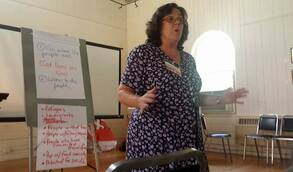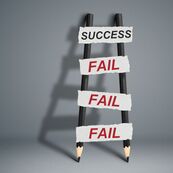 Liz teaching outreach strategies to church folk. (White woman in blue dress in front of an easel with writing.) Liz teaching outreach strategies to church folk. (White woman in blue dress in front of an easel with writing.) I read recently a pastor suggesting these roles for a pastor: Professional Speaker, Master of Ceremonies, CEO, Counselor, Fundraiser, Human Resources Director, Pillar of Virtue. While the writer is leaving ministry for many reasons, and points out many real problems with ministry, for me what was stood out was how different my list of roles is. Having a different list or roles would not solve the challenges he has faced. His experience is real. Many are sharing it because it speaks to their hearts. My experience of ministry is quite different than his. I too am a good “professional speaker” and while I’m uncomfortable with the title Master of Ceremonies, I’m a good, although quite informal, worship leader. I also do some counseling, although I’m not overwhelmed by my parishioners lives. The small size of my churches might explain that feeling, but I think it is mostly that I don’t see it as a primary purpose of my ministry. Beyond those two items, the rest of the list is simply not my calling as a pastor. For sure, I’m not a pillar of virtue. Of course none of us are, but most importantly, I do not hide my foibles and failures. I refuse this role when people try to hoist it on me. Most importantly, I’m not a CEO, fundraiser, or human resources director. At every church I’ve served, the board holds all those roles. At my first church I accidentally took over some of those roles, but I learned from those mistakes and have not done that since. I’m instead the in-house consultant. I give advice. I ask questions. I help the council and the congregation to imagine the future. I read legal documents and notice if there is weird language. I propose alternative ways of looking at the budget. I seek out grants. I ask where they see God in their work. I look for theological foundations to the work. Sometimes I grumble about their choices. But I am absolutely not in charge. Part of why I am not CEO is because I don’t buy the idea that it is the purpose of any church to grow in finances or in people. In fact I spend a lot of time helping churches to get off the bigger is better bandwagon. I do think church is a place to grow spiritually, and so spend a lot of time creating studies of biblical texts, theology, public discourse around faith, and more. Small numbers of people join me for those studies. I design worship, speak at council meetings, provide trainings, all with the idea that one of my roles is educator. And I think that church's primary role is to serve the community, so I spend time hanging out with people who are not in the church. On the top of my list of roles would be Community Organizer. A small part of my congregation joins me in that work. The thing that makes me consider leaving is the work that is over-the-top-impossible for me: Administration. Clerical work. Details. Emails. The bulletin. Finding artwork. The calendar. The to-do list. Help me Jesus! Like literally, please take these away! My list of roles: Community Organizer is most important, Educator is most fun. Although Worship Leader is most expected, it is not most important, but also it is where I get the most positive feedback. My roles as Consultant as most meaningful, and most focused on hope for the future. Clerical Assistant is the most annoying of my roles. I think what keeps me spiritually healthiest is when I remember I’m a Theologian. I don’t do much counseling, but I ask where God is in people’s lives. I don’t do much CEOing, but I ask how God is at work in the church. I don’t run outreach programs, but I search for God in the relationships we build. Not many people come to our faith formation activities, but I love the thrill of looking for God’s way together. Not enough church people are involved in our local outreach, but the work we do makes a difference in our community. I, like most clergy, am tired. It's a wide diversity of roles, and I can't be good at them all the time. I, like most working people I know, wonder if my work is where my heart is right now. I want a weekend off with my family. I want to prioritize my home. I have great sympathy for those who cannot continue the work they thought was their calling—whether that work is church work or not. For me, now, the roles fit my skills. I'd say more, but I've got to get the bulletin finished. What are your roles as a pastor?
1 Comment
 When I was in eighth grade I won the local science fair with my project Sliding Friction. I felt we hadn’t effectively used the scientific method in our classroom lab, so I redesigned the experiment to show how weight, surface area, and incline affect friction. People tell stories of very fancy equipment and high level experiments in science fairs, but what made me a winner is that I did each run 5 times, eliminated the highest and lowest readings, and graphed the results. I felt like a huge success. Later I realized that it was even a bigger win—eighth graders competed with grades 8 through 12. I had won against students who had much more science education than me. And I never entered another science fair. Sometimes success is the hardest thing to overcome. When your science fair project doesn’t win, we don’t call that a failure, although as a very competitive kid, I perhaps treated it as such. Every year I had entered, looked for the winning projects and asked, how could I do better. What would be the steps to making a better project? I checked out the notebook, and the display, and even what topics people chose for their winning projects. I asked “what is it that makes this a winner?” Each year I used my loss, my non-win, as an opportunity to learn. What was there to do with my win? How could I ever come up with an idea that was as good? How could I ever develop a project that compared. Race ahead to 2019. Over the previous year I worked my way up from walking a mile or two at 20 minutes per mile, to the end of September when I walked 14 miles at 18 minutes per mile. I was a walking machine! I got up at 5 in the morning for that 14 mile walk, but even more significantly, every week I got up 2 or 3 times a week to walk—2 to 3 miles on weekdays, and increasingly longer distances on Saturdays. When I started, my first 5K in under an hour was a huge success. I built up to 7 miles, 10 miles, 12 miles, and then 14. When my knee hurt I went to physical therapy, and unlike any other time in my life I did every exercise as directed, every day. I took part in a half marathon, celebrated with friends. And then I didn’t walk again. I didn’t do the short week day walks, and I didn’t do the longer weekend walks. My spreadsheet with times sits un-updated. I was proud of my success, but why couldn’t I keep going? In 2010 I decided I wanted to write a book. I started writing every day, with the idea that to be a writer I must spend my time writing. I enrolled in a PhD program, dropped out, found a Dmin program, wrote a thesis, took a writing course, wrote a book proposal, and in March of 2020 my book came out. I just kept doing whatever needed to be done to be the author of a published book. As part of my book proposal I suggested that I would write a weekly blog with additional stories from my research. I suggested that I would write articles in scholarly journals supporting the research in my book. I imagined that I’d keep writing. But I did not. Once the book came out I’ve never successfully written for even two days in a row. I write a blog post here and there, but I never get back into the mode of prioritizing writing as an integral part of my life. It seems like my life’s successes have all been the cause of, or at least the precursor to, continued failure. What do you think?  I met a writer who set out to get 50 rejection letters for her book manuscript. Besides being funny, it was a great way to do the hard thing of admitting you are trying to get published. When I was a kid, I loved to play with erector sets. I sat with my siblings and made amazing things. I remember often being asked “what are you making” and always replying “I don’t know yet.” I would put things together until it started to look like something, add parts, adjust my end goal to match what was happening. Externally that is a pretty good creative process. But internally was not as good. I was afraid that if I decided on an end goal, I might fail. So instead, I just didn’t decide. To have a clear failure, you need a clear goal. And clear failures are helpful for getting to next steps. With my erector set, if I had said “I’m making a car” (which, in fact, I was) then when it turned out to be a rocking chair (which it did) then I could have compared my results to my vision. I might have gotten help with parts that didn’t work. I might have seen my siblings projects and learned how they solved a problem I faced. My unwillingness to fail meant I didn’t learn to do a better job at building with our erector set. As I got older, I lost interest in an activity I once loved, because I didn’t learn to do it better over time. At the first church I served we developed an aggressive revitalization plan. Or rather, I developed it. And then I complained when parishioners didn’t do what I had planned. In the big picture, the revitalization plan failed, and the church closed. But what really happened is there were no intermediate steps, no small projects to complete, evaluate, and try again. We wanted to “get out there in the community”. But why? How often? In what ways? We never set a vision, nor any small goals to get us to that vision. Years later I can see that I one of my failures was right at the start: I failed to include the congregation in the making the plan. Knowing that I have been able to work on vitality differently in later congregations I served. By recognizing the failure, I can make adjustments to my work. Lots of people—almost everyone—has reassured me that it is not my fault that the church closed. That is true. But that doesn’t take away from my failure to include the congregation in the planning. Reassuring me that I hadn’t failed was not helpful. And it interfered with my ability to analyze how I *had* failed. For failure to lead to growth we have to admit that it happened. And the only way to know it happened is to set a meaningful goal. If our goal at that church had been to “try a few things”, well then we succeeded! We tried even more than few things. But that goal is so vague and small there was no way to learn from from it. As is the case with so many mindset challenges, the problem is circular. I don’t set concrete goals because I’m afraid of failing to meet them. And because I was afraid of failing, I can’t see that what I tried failed. And when I can’t see that I failed, I can’t find a new way that is better than the previous try. And then, when I start something new, I set a vague goal, because I don’t *know* what to do differently this time. If we can start celebrating our failures as strategies for learning, and if we can start setting real goals, we can break the circuit! So I’m working on finding the names of 50 different publishers! |
My ThoughtsFor my organized thoughts, see my book Five Loaves, Two Fish, Twelve Volunteers: Developing Relational Food Ministries. In this spot are thoughts that appear for a moment--about food programs, mission, church, building community, writing, and whatever else pops into my head. History
January 2024
Categories
All
|
 RSS Feed
RSS Feed